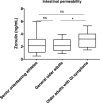Are self-reported gastrointestinal symptoms among older adults associated with increased intestinal permeability and psychological distress?
- PMID: 29554871
- PMCID: PMC5859527
- DOI: 10.1186/s12877-018-0767-6
Are self-reported gastrointestinal symptoms among older adults associated with increased intestinal permeability and psychological distress?
Abstract
Background: Despite the substantial number of older adults suffering from gastrointestinal (GI) symptoms little is known regarding the character of these complaints and whether they are associated with an altered intestinal barrier function and psychological distress. Our aim was to explore the relationship between self-reported gut health, intestinal permeability and psychological distress among older adults.
Methods: Three study populations were included: 1) older adults with GI symptoms (n = 24), 2) a group of older adults representing the general elderly population in Sweden (n = 22) and 3) senior orienteering athletes as a potential model of healthy ageing (n = 27). Questionnaire data on gut-health, psychological distress and level of physical activity were collected. Intestinal permeability was measured by quantifying zonulin in plasma. The level of systemic and local inflammation was monitored by measuring C-reactive protein (CRP), hydrogen peroxide in plasma and calprotectin in stool samples. The relationship between biomarkers and questionnaire data in the different study populations was illustrated using a Principal Component Analysis (PCA).
Results: Older adults with GI symptoms displayed significantly higher levels of both zonulin and psychological distress than both general older adults and senior orienteering athletes. The PCA analysis revealed a separation between senior orienteering athletes and older adults with GI symptoms and showed an association between GI symptoms, psychological distress and zonulin.
Conclusions: Older adults with GI symptoms express increased plasma levels of zonulin, which might reflect an augmented intestinal permeability. In addition, this group suffer from higher psychological distress compared to general older adults and senior orienteering athletes. This relationship was further confirmed by a PCA plot, which illustrated an association between GI symptoms, psychological distress and intestinal permeability.
Keywords: Gastrointestinal symptoms; Intestinal barrier function; Older adults; Psychological distress.
Conflict of interest statement
Ethics approval and consent to participate
The study obtained ethical approval by the Uppsala Regional Ethics Review Board (Dnr. 2012/309, 2013/37 and 2015/357). All procedures were carried out in accordance with the declaration of Helsinki and written informed consent was acquired from all participants before study start.
Consent for publication
Not Applicable.
Competing interests
The authors declare that they have no competing interests.
Publisher’s Note
Springer Nature remains neutral with regard to jurisdictional claims in published maps and institutional affiliations.
Figures



References
-
- Kinnunen O. Study of constipation in a geriatric hospital, day hospital, old people's home and at home. Aging (Milano) 1991;3(2):161–170. - PubMed
Publication types
MeSH terms
Substances
Grants and funding
LinkOut - more resources
Full Text Sources
Other Literature Sources
Medical
Research Materials
Miscellaneous

